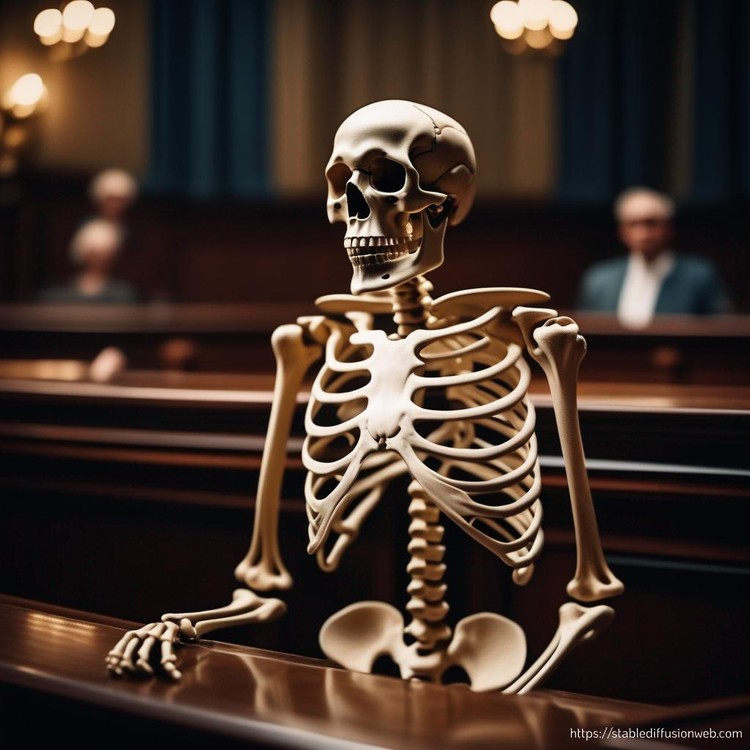
29 January 2024
The problem of late judgments is the focus of a Judicial Conduct Tribunal in Johannesburg. Image generated by Stable Diffusion using the prompt “Humorously show a skeleton waiting an inordinately long time for a court judgment” (public domain)
The Judicial Conduct Tribunal inquiry into the possible impeachment of suspended Gauteng High Court Judge Nomonde Mngqibisa-Thusi, for failing to deliver 21 judgments timeously, is now being held behind closed doors.
The tribunal chair is retired Constitutional Court Judge Chris Jafta. On Monday he instructed members of the media and the public to leave the hearing. It is taking place in Johannesburg.
A live feed of proceedings, which was being aired on the official RSA Judiciary Youtube channel and which had been advertised on the official X (formerly Twitter) account, was also shut down.
Jafta said the default position in the Judicial Services Commission Act was that all tribunal hearings had to be held in-camera. Should anyone, other than the tribunal members, the judge being charged with misconduct, legal representatives and secretariat want to attend, they would have to make a formal application.
He would then consider that application “in the interests of transparency and the public interests” and with consultation with the Chief Justice.
“I want to draw the attention of members of the media, that if they want to report and access documents, they will have to make a special application so they don’t find themselves on the wrong side of the law. It constitutes a criminal offence,” he said.
At the start of Monday’s proceedings, Judge Gcina Malindi, who is part of Judge Mngqibisa-Thusi’s legal team, asked that the entire proceedings be held in-camera - or that as an alternative three witnesses give evidence behind closed doors.
This included Judge Mngqibisa-Thusi, a clinical psychologist and an expert on spirituality.
“The aspect of spirituality will touch on aspects of initiation which will cause discomfort to the witnesses and as proceedings go on, we will be tendering evidence about the stigma attached to that aspect of her life. Testifying in public will certainly compromise her ability to freely interact with the panel,” he submitted.
It was at this point that Judge Jafta pointed out that there was no need for Judge Mngqibisa-Thusi to make such an application, because of the Act’s “default” position.
“Before I received the notice (from Judge Malindi), I thought the default position was that the hearing was open to the public. That was the position before the Act was amended with the introduction of a tribunal and the Judicial Conduct Committee,” Judge Jafta said.
Mbekezeli Benjamin, Research and Advocacy officer at Judges Matter said the blanket ban had come as a “surprise”.
“While section 29 of the JSC Act provides a discretion on the Tribunal President to allow public access and media coverage to tribunal hearings, the practice over the last few years has been that all tribunal hearings are open to the public, including a livestream provided by the Office of the Chief Justice.”
He said because of the sensitivity of some of the evidence in Judge Mngqibisa-Thusi’s tribunal, her need for privacy was understandable.
“However, this must be balanced against the broader public interest and the need for transparency. After all, the tribunal is set up to investigate her failure to deliver judgments on time, which undoubtedly the public needs to understand,” he said.
Judges Matter will write to the Tribunal to request access to the hearing.
When the tribunal sat in December, there were indications that Judge Mngqibsa-Thusi would rely on medical and spiritual experts to explain why she had not been able to do her job properly.
The hearing was adjourned to allow her to obtain the necessary reports.
The complaint was laid against her by Gauteng Judge President Dunstan Mlambo who was expected to begin his evidence on Monday morning.
Judge Mngqibisa-Thusi is not expected to challenge the “stated facts” - that she did not hand down the judgments on time. But she is expected to outline that this was because of personal problems she had at the time.
The tribunal will have to determine whether she suffers from incapacity, is grossly incompetent or guilty of gross misconduct. It is expected to run until 2 February.
Of late, tribunal hearings have been open to the public including that of Pretoria High Court Judge Nana Makhubele who is accused of gross misconduct for violating the separation of powers principle because she was a judge and, at the same time, the chair of PRASA “advancing corruption and state capture”.